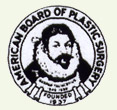What Does “Board Certified Plastic Surgeon” Mean?


Board (bôrd) : An organized body of administrators empowered to set the company’s policy and objectives.
Certify (sərˈtifikit) : Formal practice by which an accredited agency assesses and verifies the attributes, characteristics, quality or qualification of an individual in accordance with established requirements or standards.
The board we are referring to is the American Board of Plastic Surgery (ABPS), one of the 24 member boards overseen by the American Board of Medical Specialties (ABMS) and the only board which certifies physicians in the specialty of plastic and reconstructive surgery for the entire body. Membership with a specialty board in the ABMS is important because those 24 boards are the only recognized specialties in American medicine. You may be surprised to learn that official sounding “boards” such as the “American Board of Cosmetic Surgery” or the “American Board of Aesthetic Gynecology” are NOT members of the ABMS and are NOT recognized accrediting boards by hospitals or surgery centers.
Hospitals and accredited ambulatory surgery centers are required to restrict granting surgical privileges only to those physicians who demonstrate the appropriate training and board certification. ABMS board qualifications are therefore a must for all physicians on their medical staffs.
How does this affect you? If a surgeon offers to do your surgery in an office operating room where operating privileges are not tightly controlled you don’t know what standards that office is requiring for its physicians. In fact, the physician/owner may be the only person who decides the qualifications of its staff. When in doubt, verify the physician’s hospital privileges before agreeing to an office procedure.
To become certified by the American Board of Plastic Surgery, a member is required to participate in:
- Initial Education and Training: All ABPS doctors must “graduate from an accredited medical school and complete at least five years of additional training as a resident surgeon in a program accredited by the Accreditation Council for Graduate Medical Education or the Royal College of Physicians and Surgeons of Canada. This includes a minimum of five years of residency training in all areas of surgery, including at least two years devoted entirely to plastic surgery.” – abplsurg.org
- Examination: Each specialty board, including the American Board of Plastic Surgery, has their own comprehensive written and oral examinations that a candidate must pass to become a certified specialist.
- Continuing Education: Beginning in 1995, the ABPS added a third requirement of its members to keep up with the ever changing realm of plastic and reconstructive surgery. Now certifications are given a lifetime of 10 years and throughout those 10 years a doctor must keep his/her certification up to date with continuing education and further examination. Physicians participating in this program may display the Starmark for Maintenance of Certification (MOC).
Board Certification is important when searching for a plastic surgeon because you can be sure an ABPS member has the knowledge, training, experience and skills to provide you with the highest quality patient care. When any doubt exists regarding a physician’s credentials, you can verify board certification status with the ABMS and check the physician’s hospital privileges.
Sources: American Board of Medical Specialties: https://www.abms.org/